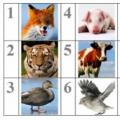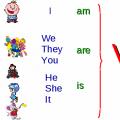How to say day in German. Origin of the days of the week in German
Today I will tell you about the days of the week in German.
This is what they are called: Montag (Monday), Dienstag (Tuesday), Mittwoch (Wednesday), Donnerstag (Thursday), Freitag (Friday), Samstag (Saturday), Sonntag (Sunday).
Remember that the days of the week in German are masculine.
The preposition we use when we want to say When action takes place - am.
Am Montag - on Monday, am Freitag - on Friday, am Sonntag - on Sunday.
Am Montag beginnt eine neue Woche.— A new week begins on Monday.
How to say Monday to Friday in German? Using prepositions von and bis: von Montag bis Freitag.
And if we need to say the phrase: the night from Monday to Tuesday, we use prepositions - vom and zum:
die Nacht vom Montag zum Dienstag- night from Monday to Tuesday
If you do something every Tuesday, every Wednesday or every other day of the week, then the ending -s is added to the day of the week: montags — on Mondays ,samstags — on Saturdays.
Was für einen Tag haben wir heute? = Was haben wir heute?- What day is today?
Heute ist Sonntag. - Today is Sunday.
Gestern war Samstag.— Yesterday was Saturday.
Morgen ist Montag.- Tomorrow is Monday.
Ab Montag bis Freitag arbeite ich.— From Monday to Friday I work.
Seit Dienstag habe ich ihn nicht mehr gesehen. “I haven’t seen him since Tuesday.”
Bis Montag! - Till Monday!
Along with the theme “days of the week”, it is also worth considering the parts of the day: Morgen - morning, Abend - evening, Vormittag - afternoon, Nachmittag - afternoon, Nacht - night. All of them are also masculine, except for the word “night” - which, like in Russian, is a feminine word.
Now attention! The following words are written together. And once upon a time, before 1996, they were written separately.
Montagvormittag- Monday before lunch
Montagabend - on Monday night
Montagnacht- Monday night
Montagvormittag wird schneien.— It will snow until noon on Monday.
I have prepared the following diagram, which examines “Tuesday” in different phrases. Instead of Tuesday - of course - any other day of the week can be used. Use:

Days of the week in German: some idioms
The Germans made up idioms and sayings for some of the days of the week. From what we know: not everything is Maslenitsa for the cat.. Do you know this one? In the German version, it uses “Sunday”. Alle Tage ist kein Sonntag.— Not all days are Sundays.
But you can remake this saying and use it like this: Sie hat alle Tage Sonntag. — Every day is a holiday for her.
They say the following about those who shirk work or play truant: Er macht blauen Montag.
If everything goes according to schedule for a German, he will say: wie der Montag auf den Sonntag klappen.
You should start learning any language from the basics. If you miss something important at the beginning, then difficulties will arise later that will not allow you to move forward. For example, if you do not master pronunciation properly, then spoken speech will be difficult to understand. Without excellent knowledge of grammar, you will not be able to write even the simplest letter.
A basic set of words will help you navigate conversations with strangers in a country where German is the main language. Learn a new subject step by step, do not get ahead of yourself - this way you will master it one hundred percent.
Days of the week
All days of the week in German have a masculine gender and an article. der. Every word has an ending - tag:
- Monday: Montag (montag);
- Tuesday: Dienstag (dienstag);
- Wednesday: Mittwoch (mitvokh);
- Thursday: Donnerstag (donerstag);
- Friday: Freitag (freitag);
- Saturday: Samstag/Sonnabend
- Sunday: Sonntag.
Saturday has two translations and pronunciations. The first one is more formal and is used more often.
The easiest day of the week to remember is Wednesday - it literally translates as “middle of the week” - Mitte der Woche = der Mittwoch.
In sentences, days of the week are used together with the preposition am. Eg: Am Montag besuchte ich meinen Vater - “On Monday I visited my father.” Am Donnerstag ging Helga zum Arzt - “Olga went to the doctor on Thursday.”
Some actions may be permanent - they are expressed using the day of the week, expressed in the plural and without a preposition. For example: For example, Ich treibe Montags und Freitags Sport - “I train on Mondays and Fridays.”
A certain time period is emphasized using the design von... bis. Articles are also omitted here: Ich war in Moskau von Mittwoch bis Sonntag - “I was in Moscow from Wednesday to Sunday.” Wirst du bist daheim von 5 bis 7 morgen? - “Will you be home tomorrow from 5 to 7”?
How can a child quickly learn the days of the week?
For children, the most acceptable form of play is memorizing one or another section of the German language. In order to quickly remember the days of the week, you can learn a funny rhyme with your baby:
Am Sonntag scheint die Sonne.
Am Montag trifft er Herrn Mon.
Am Dienstag hat er Dienst.
Am Mittwoch ist Mitte der Woche.
Am Donnerstag donnert es.
Am Freitag hat er frei.
Und am Samstag kommt das Sams.
“The sun is shining on Sunday.
On Monday he will meet Mr. Mon (Ponedelkus).
On Tuesday for his service.
Wednesday is the middle of the week.
There's thunder on Thursday
He is free on Friday.
And (then) Sams (Subastic) will come on Saturday.”
In this simple poem you will find new words:
- scheinen / schien / geschienen – to shine, to shine;
- die Sonne – sun;
- treffen / traf / getroffen – to meet;
- der Dienst / die Dienste – service;
- die Mitte / die Mitten – middle;
- donnern / donnerte / gedonnert – to thunder;
- es donnert - thunder roars;
- frei – free;
- kommen / kam / gekommen – to come.
If your child is studying German at school or with a private teacher, he will probably be asked to learn this rhyme. The parents’ task is to support the child and be sure to praise him when he tells it correctly.
Related words
The theme of the week and its days includes a few more basic words:
- day: der Tag (der Tag);
- week: die Woche (di Woche);
- days of the week: die Wochentage (di Wochentage);
- day of the week: der Wochentag (der Wochentag);
- the day before yesterday: vorgestern (forgestern);
- yesterday: gestern (gestern);
- today: heute (hoite);
- tomorrow: morgen (morgen);
- the day after tomorrow: übermorgen (ubermorgen);
- das Wochenende – weekend;
- der Feiertag is a day off due to a holiday.
The vocabulary of every beginner should include the following constructions:
- am Montag abend - on Monday evening (am Montag abend);
- alle Montage - every Monday (alle Montage);
- montags – on Mondays;
- den ganzen Montag hat es geregnet - it rained all Monday (der ganzen Montag hat es geregnet);
- die Nacht vom Montag zum Dienstag - the night from Monday to Tuesday (di Nacht vom Montag zum Dienstag);
- eines schönen Montags - one fine Monday, one day on Monday (eines schönen Montags).
Using associative memory
Knowing all these words and phrases, you can begin to learn how to take part in simple conversations with a clear pronunciation of each sound. It is important not to forget about the exact pronunciation, which is recommended to be practiced by repeating the words after the speaker repeatedly.
If you learn the days of the week one after another, like a poem, it may seem boring. You can add variety to teaching techniques with fun flashcards. On one side you can place the name of the day of the week in Russian and a characteristic picture. It will help you use memory, which is based on associations. On the other side there will be a hint written - how the day of the week is written in German. You can first learn how Russian days of the week will be pronounced and written in German, and then vice versa.
Once again I welcome lovers of foreign languages, in particular German. It’s been a long time since there have been German collections and I decided to please, and maybe upset some readers website. Basic German vocabulary- This is probably the most important aspect for all beginning students.
At the moment I am trying to break down all the important German vocabulary in sections by topic, because I think this method of studying is more productive and effective. Honestly, I don’t know which share of site visitors is greater: or, but if you think logically, it’s probably English :), after all, this is not such an educational portal for world languages. This does not prevent me from creating dictionaries, because German is exactly the language that I still need to study for a long time and productively.
Today I invite you to familiarize yourself with names of the days of the week in German plus other important words from this topic. As always, you will receive different formats of dictionaries - this is both in a regular document and in the format for Lingvo Tutor. The correct article before a word is also an important point in learning German, but here you don’t have to worry, because in German there is always an article before any day of the week DER.
I have also prepared other similar vocabulary (all in one dictionary), which is quite often missed when studying the days of the week. Words like gestern, heute, morgen, übermorgen should always be in your memory. Some will say that these are elementary words, but sorry, not everything is here "advanced" German speakers. I wish you good luck in your studies and patience in everything.
Learned words “days of the week” in German with translation:
der Montag- Monday
der Dienstag- Tuesday
der Mittwoch- Wednesday
der Donnerstag- Thursday
der Freitag- Friday
der Samstag/der Sonnabend- Saturday
der Sontag- Sunday
das Jahr- year
der Monat- month
die Woche- a week
der Tag- day
die Wochentage- days of the week
das Wochenende- weekend
der Feiertag- day off due to a holiday
vorgestern- day before yesterday
gestern- yesterday
heute- Today
morgen- Tomorrow
übermorgen- day after tomorrow
In this lesson we will look at an important topic related to the year in German. First of all, let's get acquainted with the basic words:
das Jahr- year
der Monat- month
die Woche- a week
der Tag- day
As you can see, the gender of German words in almost every case coincided with Russian, except for the word “year”. It won't be difficult to remember.
Seasons
Names of all seasons (die Jahreszeiten)- male:
der Winter- winter
der Frühling- spring
der Sommer- summer
der Herbst- autumn
If you want to say that some event happened in spring, winter, summer or autumn, you will need a preposition in, which merges with the article into a new preposition im, for example: im Herbst.
Months
Months in German are also masculine:
der Januar- January
der February- February
der März- March
der April- April
der Mai- May
der Juni- June
der Juli- July
der August— August
in September- September
der Oktober- October
in November- november
der December- December
The same thing happens with months as with seasons: if it is necessary to answer the question “when?”, a preposition is used im, for example: im Oktober. The word does not receive any additional endings.
Days of the week
The names of the days of the week have some peculiarities: for example, there are two words to designate Saturday, one of them (Sonnabend) used in northern Germany, other (Samstag)- on South. And “Wednesday” is the only day of the week that does not have the word “day” in its name:
der Montag Monday
der Dienstag Tuesday
der Mittwoch Wednesday
der Donnerstag Thursday
der Freitag Friday
der Sonnabend/ der Samstag Saturday
der Sonntag Sunday
das Wochenende weekend
Remember: The names of all days of the week are pronounced with the emphasis on the first syllable. And when answering the question “When?” (Wann?) with the day of the week you'll need an excuse am: am Montag.
If you want to talk about an action that is repeated on certain days, a preposition is not needed at all, and the ending is added to the name of the week "s". For example: Sonntags gehen wir ins Kino. Wherein sonntags is an adverb, and in the middle of a sentence it will be written with a small letter.
When indicating a gap, use prepositions von And bis. In this case, articles are not needed: Ich arbeite von Montag bis Freitag.
Times of Day
The names of the time of day are also almost all masculine:
der Morgen- morning
der Mittag- day; noon
der Abend- evening
But: die Nacht- night
The same principle applies to the names of times of day as with days of the week - use a preposition am:
am Morgen
am Mittag
BUT: in der Nacht
Another difference is the use of a preposition with the words noon and midnight:
am Mittag- at noon
um Mitternacht- at midnight
When indicating periodicity, also use the ending "s":
mittags- during the day
abends- in the evening, in the evenings
nachts- at night, at night
Also pay attention to the following expressions:
Anfang August- at the beginning of August
Mitte Juni- in mid-June
Ende Januar- in the end of January
Anfang, Mitte, Ende des Jahres- at the beginning, in the middle, at the end of the year
Mitte Sommer- in the middle of summer
Important! To indicate time, words such as:
heute- Today
gestern- yesterday
morgen- Tomorrow
übermorgen- day after tomorrow
These words will help tell you "tonight" or "yesterday morning": heute Morgen, gestern Abend. And to say "tomorrow morning", use the phrase morgen früh.
Do you remember everything? Check it out with the exercises!
Lesson assignments
Exercise 1. Use the correct preposition.
1. … Sommer 2. … der Nacht 3. … Morgen 4. … Mitternacht 5. … April 6. … Winter 7. … Samstag 8. … Dienstag …. Sonntag 9. … September 10. … Mittag
Exercise 2. Translate into German.
1. Last night we watched TV. 2. She works on Mondays, Thursdays and Fridays. 3. In the spring we will go to Germany. 4. The day after tomorrow I will buy a car. 5. On Wednesday I'm going to the theater. 6. Call (anrufen) me tomorrow morning. 7. At the end of December he will take the exam (eine Prüfung bestehen). 8. Her birthday is in January. 9. On weekends he often cleans (aufräumen). 10. At the beginning of the year we have a vacation (Urlaub).
Exercise 1.
1. im 2. in 3. am 4. um 5. im 6. im 7. am 8. von … bis 9. im 10. am
Exercise 2.
1. Gestern sahen wir fern. 2. Sie arbeitet montags, donnerstags und freitags. 3. Im Frühling fahren wir nach Deutschland. 4. Übermorgen kaufe ich ein Auto. 5. Am Mittwoch gehe ich ins Theater. 6. Rufe mich morgen früh an. 7. Ende Dezember besteht sie eine Prüfung. 8. Im Januar hat sie den Geburtstag. 9. Am Wochenende räumt er auf. 10. Anfang des Jahres haben wir Urlaub.
The seven-day week owes its origin to Ancient Babylon, then the new periodicity spread among the Romans, Jews and Greeks and later reached Western Europe.
The days of the week in European languages are associated with the names of the planets, which are named after Roman gods. In this regard, the days of the week in European languages have a common etymology. However, the origin of the days of the week in German has certain differences. The Germanic tribes glorified primarily the German-Scandinavian gods, corresponding in their role to the Roman gods, this fact was manifested in the names of the days of the week.
Montag - "day of the moon" refers to the moon goddess.

Dienstag - this day is associated with the name of the German-Scandinavian sky god Ziu (Tiu, Tyr, Tyr), is an analogue of the god of war Mars. In Germanic mythology, Ziu was considered the god of military valor.

Mittwoch (Wodanstag) - the day of the week is named after the German-Scandinavian god Wodan (Wodan, Woden, Wotan. Woden is a god who became famous for the invention of the runic alphabet, in connection with this a parallel can be drawn with the god Mercury.

Donnerstag - this day of the week owes its name to the German-Scandinavian god of thunder (weather) Donar (Donnar), who is identified with Jupiter.

Freitag - the day of the week got its name from the German-Scandinavian goddess of love and fertility Frija (Freya, Frigga), which corresponds to the Roman goddess Venus.

Samstag - this day is not directly related to the name of the planet and deity, but comes from the Hebrew word Sabbat (Sabbath). But the concept of Sabbatai is based on the combination Stern Saturn (the star of Saturn).
 Phrasal verbs that are not taught at school TO TALK Features of phrasal verbs
Phrasal verbs that are not taught at school TO TALK Features of phrasal verbs Crossword puzzle in English for children “animals in the zoo”
Crossword puzzle in English for children “animals in the zoo” Suffixes in English: their role in word formation
Suffixes in English: their role in word formation